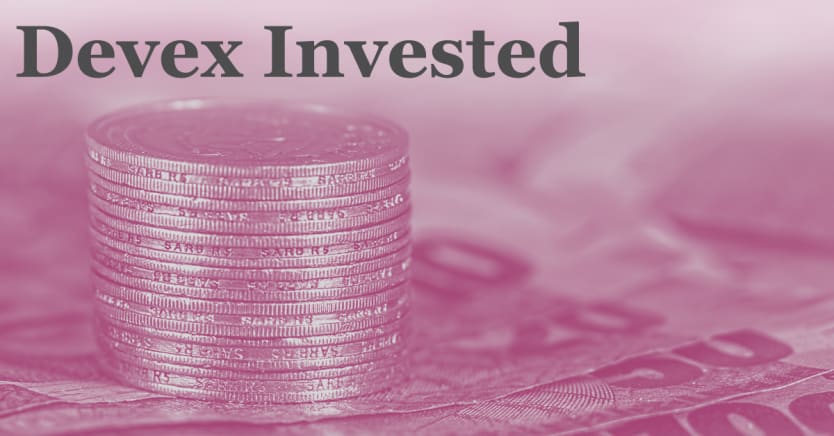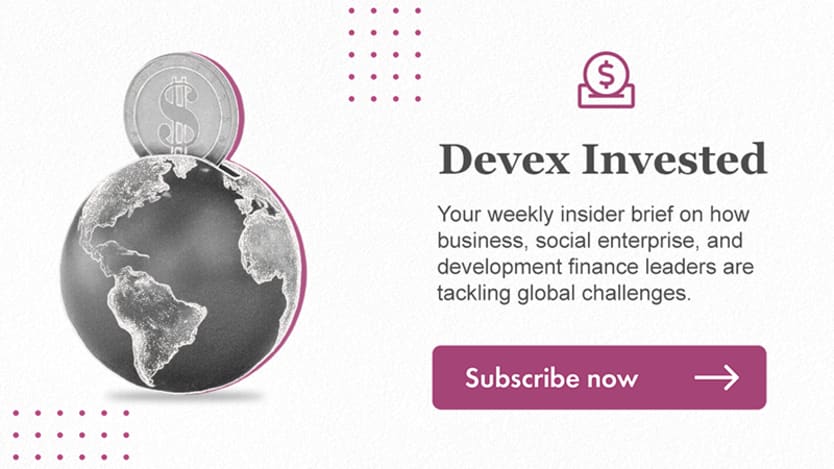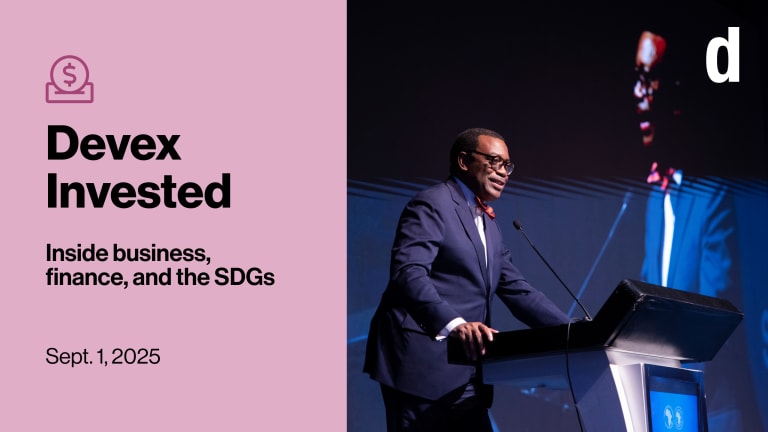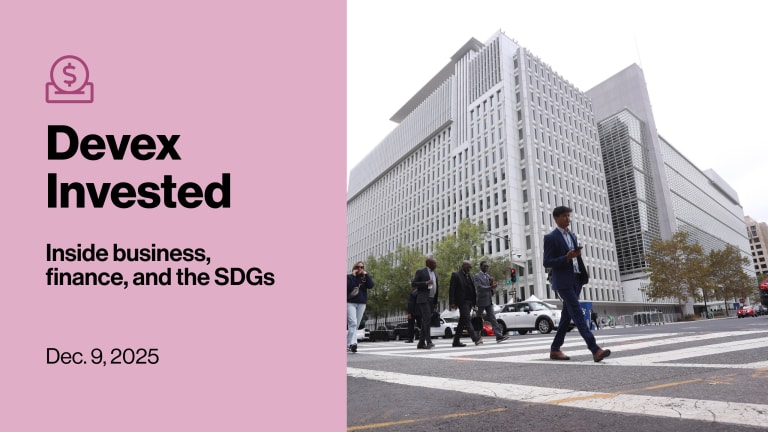Presented by International Monetary Fund

It's a tough time to lead a multilateral development bank. The presidents of the Inter-American Development Bank and World Bank — both Trump administration nominees — have found themselves in hot water over an ethics probe and climate change denial, respectively. So far, one has been fired, and the other is still hanging on.
First, a look at IDB:
• The details: Mauricio Claver-Carone is out of a job after the IDB governors voted Monday to remove him. An independent ethics investigation found that Claver-Carone — who was the first U.S. national to lead the lender in its 62-year history — had an intimate relationship with a subordinate and significantly raised her salary. A spokesperson for the U.S. Treasury tells Devex that Claver-Carone had failed to fully cooperate with the investigation and accused him of creating a “climate of fear of retaliation” at the bank, both for staff and borrowing countries. MCC, as he’s often known, has so far denied any wrongdoing and told Reuters he plans to sue his now-former employer.
• What’s next: Ex-Citi banker Reina Irene Mejía Chacón is taking over as interim IDB president, moving up from her role as executive vice president, per protocol. Meanwhile, an election for the bank’s next president will likely take place within the next two months, per internal rules, a source familiar with the process tells Devex.
• The big questions: Will the Biden administration nominate a Latin American to the role, reverting to a long-held norm? What do the political divides across Latin America and the Caribbean mean for the next IDB election? Under Claver-Carone, the IDB reached a record $23.4 billion in new funding approvals, commitments, and private sector mobilizations in 2021. Will the bank sustain that pace without him?
Read more: Latin American development bank ousts chief, ex-Citi banker takes over
Meanwhile, over at the World Bank …
• The details: Climate advocates called for World Bank President David Malpass to be fired after he said “I am not a scientist” when asked at a public event last week whether he believed that global warming was caused by humans burning fossil fuels. He later tried to walk back the gaffe, but it had already added to a wave of frustration with his climate credentials that has hounded him since he was nominated for the role in 2019.
• What’s next: Malpass has spoken with the World Bank’s Committee of the Whole, sources with knowledge of the meeting tell Shabtai. The COW (yes, that is their real acronym) deliberates issues before they’re submitted to the board for guidance. Malpass met with staff Tuesday morning and focused largely on the climate issue — and according to attendees, the meeting was tense. If people were unconvinced going into the meeting, he may not have swayed them, though he apologized for his remarks and "poor performance" last week. We're told he also apologized to the COW.
• The big questions: Will the bank’s shareholders cut short Malpass’ five-year term, or allow him to stick it out until April 2024? Given Malpass’ record on climate finance, what more could or should the bank do?
If you've got more big questions on the banks — or were at Malpass' meeting with staff on Tuesday — get in touch with Shabtai at shabtai.gold@devex.com. We always protect our sources.
Read: World Bank chief clarifies climate beliefs amid calls for his ouster
Background reading: How the World Bank can be bolder on climate finance after COP 26
For Devex Pro members: We have analyzed how much of the World Bank’s over $73 billion funding was allocated to climate and other sectors in 2021. If you haven’t gone Pro yet, read the piece by starting your 15-day free trial now.
Point of no return
Upcoming events
IN PERSON & ONLINE
Devex Invested: The Future of Development Finance
Oct. 25
IN PERSON & ONLINE
2nd ADB Innovation Fair
Oct. 5
ONLINE
2022 HPCC Systems Community Summit
Oct. 10-13
WASHINGTON, D.C.
Civil Society Policy Forum Annual Meetings 2022
Oct. 11-14
CANADA
The Eighth Public Investors Conference
Oct. 27-28
On the margins at the 77th United Nations General Assembly in New York last week, our colleague Omar Mohammed spoke with James Mwangi, CEO of Equity Group, one of the largest financial institutions in East and Central Africa.
Mwangi said Equity wants to do more than just create financial products geared toward financing climate-related projects. “It's the entire funding of the group which is nearly $13 billion that is being led in a very responsible way towards sustainability,” he said. And as for the planet: “Are we reaching the point of no return? That’s the word and phrases that are now being used as a normal part of conversation,” he said. “I've never seen before the heightening of focus on sustainability. And part of sustainability is focusing on how to mitigate and how to adapt to climate change.”
Related op-ed: World Bank and MDBs must show proactive climate leadership
ICYMI: Ex-World Bank official calls for expansion of fund for poorest nations
+ Listen to episode four of our podcast series — UNGA Decoded — where Devex chats with Rockefeller Foundation President Rajiv Shah on unlocking climate leadership and what the MDBs must do. You can also listen on Apple Podcasts, Spotify, SoundCloud, or YouTube.
And catch up on all our coverage of UNGA 77 here.
Following the climate money
Building on its report from July, a new OECD analysis of climate finance trends from 2016-2020 has found:
• The mobilization of private climate finance was lower than anticipated, with most having been mobilized in countries with relatively low-risk profiles.
• Over half of climate finance was concentrated in four sectors: energy; transport; water and sanitation; and agriculture, forestry and fishing.
• Mitigation finance is heavily concentrated on energy and transport while adaptation finance focuses more on water and sanitation, and agriculture, forestry and fishing.
• In contrast to many mitigation projects, adaptation projects often lack the revenue streams needed to secure large-scale private financing.
Setting the standard
When donors give to nonprofits in other countries, they need to be able to trust that those organizations are solvent and honest. Enter international accounting standards. This may sound dull, but it’s important, our colleague David Ainsworth writes.
DevExplains: Why nonprofits want an international accounting standard
What we’re reading
Your next job?
Lead Public-Private Partnership Investment Officer
Islamic Development Bank (IsDB)
Jeddah, Saudi Arabia
• After spending $1 trillion, China reins in its Belt and Road program. [Wall Street Journal]
• Global climate leaders push for overhaul of IMF and World Bank. [Financial Times]
• United Nations General Assembly casts spotlight on split between rich and poor. [Devex]
• Two pension funds quit the Glasgow Financial Alliance for Net Zero for financial institutions. [Financial Times]
Adva Saldinger and Omar Mohammed contributed reporting.










